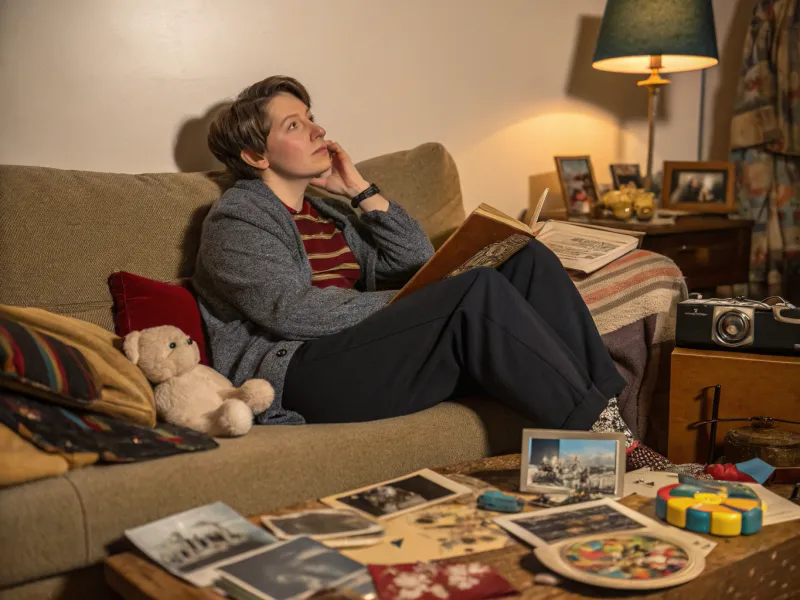29 Tiny Signs You’re Not Ready For A Relationship (No Matter How Badly You Want One)
In a world that often glorifies relationships as the ultimate goal, it’s easy to overlook the subtle signs that might indicate you’re not quite ready for one. Many find themselves yearning for companionship, yet struggle with underlying issues that prevent a healthy connection.
This post invites you to take a step back and reflect on your emotional landscape. Recognizing these signs is not about judgment but about fostering personal growth and self-awareness.
By acknowledging what holds you back, you empower yourself to approach love from a place of completeness and confidence.
Let’s go over 29 tiny but significant indicators that suggest you might need a little more time to grow before diving into a relationship.
1. Seeking Constant Validation

Have you ever caught yourself refreshing your social media feed, hoping for likes or comments to boost your mood? This behavior often points to an internal need for constant validation from others. When you rely heavily on external approval, it’s challenging to form a balanced relationship where both partners feel secure. Relationships thrive on mutual respect and understanding, not on one partner constantly needing reassurance.
Imagine being in a relationship where you’re always questioning if your partner truly cares unless they’re continuously expressing it. This dynamic can lead to exhaustion for both parties. It’s essential to find confidence within yourself first. Consider spending time doing activities that build self-esteem independently.
Before seeking out a romantic partner, focus on nurturing your self-worth. When you’re comfortable in your skin, you’ll be more equipped to engage in a relationship that’s fulfilling and affirming. Remember, true love adds to your happiness; it doesn’t create it from scratch.
2. Fear of Vulnerability

Opening up to another person can be terrifying, especially if past experiences have left scars. If you find yourself avoiding deep conversations or shying away from expressing true feelings, it might be a sign that you’re not ready. Vulnerability is a cornerstone of a healthy relationship.
When you hold back, you deny your partner the chance to know the real you, creating a barrier that’s hard to breach. Relationships require honesty and openness, both of which are impossible without vulnerability. Start by practicing with close friends or family.
Discuss your feelings and fears in a safe environment where you know you won’t be judged. Gradually, you’ll find it easier to open up to a romantic partner. A relationship filled with trust and acceptance begins with your courage to be seen as you truly are.
3. Comparing New Partners to an Ex

Holding onto the past can prevent us from embracing the present. If you find yourself comparing every potential partner to an ex, it’s a sign that you’re not fully available for a new relationship. This comparison creates unrealistic standards and often leads to disappointment.
Each person is unique, and measuring them against someone from your past prevents authentic connections from forming. Reflect on why you’re holding on to the past. It’s important to understand what made your previous relationship special, but it’s equally important to let go.
Clear your emotional space by acknowledging the lessons learned from past relationships and setting them aside. Focus on the qualities you truly value in a partner, rather than those you miss from your ex. This shift in perspective will allow new relationships to flourish on their own merit, free from the shadow of past loves.
4. Struggling with Boundaries

Healthy relationships thrive on respect and understanding, which are impossible without clear boundaries. If you struggle to say no or often feel taken advantage of, it could indicate a need to establish stronger personal boundaries. This challenge often stems from a desire to please others at the cost of your own needs.
In relationships, this can lead to resentment and a loss of identity, as one partner bends over backward to accommodate the other. Practice setting small boundaries in everyday situations. It might be as simple as deciding to leave work on time or declining an invitation when you’re too tired.
Gradually, you’ll build the confidence to establish more significant boundaries in your personal relationships. By respecting your own limits, you allow yourself to engage in partnerships where both individuals feel valued and respected.
5. Overemphasis on Perfection

Perfectionism can be a barrier to genuine connection, as it often focuses on flaws rather than strengths. If you find yourself constantly seeking the perfect partner, or expecting yourself to be without fault, it may be a sign you’re not ready for a relationship. Such expectations create pressure and unrealistically high standards.
The truth is, no one is flawless, and real relationships are about embracing imperfections in both yourself and your partner. Start by acknowledging that imperfection is part of human nature.
Celebrate the small victories and learn to appreciate the beauty in life’s messiness. This acceptance will help you approach relationships with patience and understanding, allowing love to grow in a nurturing, authentic environment.
6. Avoiding Deep Conversations

Conversations are the lifeblood of meaningful relationships, providing a glimpse into each other’s thoughts and feelings. If you find yourself skirting around deep topics or changing the subject when emotions arise, it might be a sign that you’re not fully ready to connect on a profound level.
Avoiding these conversations can keep relationships superficial, lacking the depth needed for true intimacy. Practice engaging in deeper discussions with people you trust.
Explore topics that challenge you to think and feel. Over time, you’ll become more comfortable with vulnerability and emotional honesty, paving the way for a future relationship grounded in genuine understanding and connection.
7. Emotional Unavailability

Emotional availability is crucial for a healthy relationship. If you’re preoccupied with work, social media, or other distractions, it might indicate that you’re avoiding emotional engagement. When you’re emotionally unavailable, you miss the opportunity to connect deeply with a partner.
This behavior often masks fears or unresolved issues that need addressing. Begin by reflecting on what’s holding you back from emotional openness. Consider journaling your thoughts or speaking with a trusted friend.
Once you identify the barriers, take small steps toward being present and attentive in your interactions. By doing so, you’ll start building the foundation for a relationship where both partners feel seen and heard, fostering genuine emotional intimacy.
8. Fear of Commitment

Commitment fears can manifest in countless ways, often leading to avoidance of long-term relationships. If the thought of committing to a single person makes you uneasy or you find yourself sabotaging relationships when they get serious, it’s a sign that you may not be ready.
The root of this fear often lies in past experiences or deep-seated beliefs about relationships. Take time to explore these feelings and consider how they impact your approach to love.
Therapy or counseling can provide valuable insights and coping strategies. By addressing commitment fears, you pave the way for relationships that are stable and enduring, built on mutual trust and a shared vision for the future.
9. Prioritizing Career Over Relationships

Balancing career goals with personal life is crucial, but if work consistently takes precedence over relationships, it might indicate that you’re not ready for a romantic commitment. This prioritization often stems from a desire to establish a sense of identity and success.
While ambition is admirable, it shouldn’t come at the expense of meaningful personal connections. Reflect on what drives your career focus and whether it leaves room for nurturing relationships.
Consider dedicating specific times for personal life without work distractions. By creating space for both career and love, you’ll find a more harmonious balance that accommodates growth in all aspects of life.
10. Negative Self-Talk

The way you speak to yourself profoundly impacts your relationships. If negative self-talk dominates your internal dialogue, it can hinder your readiness for love. This mindset often leads to self-doubt and insecurity, affecting how you perceive and interact with potential partners.
Acknowledge these critical thoughts and challenge them with positive affirmations. Replace negativity with truths about your strengths and achievements.
Engage in activities that nurture self-love and confidence. As you cultivate a kinder relationship with yourself, you’ll be more prepared to invite a partner into your life who respects and appreciates you for who you truly are.
11. Unresolved Past Hurts

Emotional baggage from past relationships can weigh heavily on your heart, making it difficult to move forward. If you find yourself dwelling on old wounds or unresolved issues, it may indicate that you’re not ready to embrace new love.
Holding onto these hurts prevents you from being emotionally available to a partner. Take proactive steps to heal by seeking closure or engaging in self-care practices that promote emotional well-being.
Consider speaking with a therapist to gain insights into past relationships and how they influence your current mindset. By resolving lingering emotions, you make space for new connections that are healthy and fulfilling.
12. Inconsistent Communication

Effective communication is vital for relationship success. If your communication habits are inconsistent, such as responding sporadically or avoiding conversations, it may signal that you’re not prepared for the commitment a relationship requires. This pattern can lead to misunderstandings and frustration for both parties.
Practice setting aside time to engage in meaningful conversations, giving your full attention to the interaction. Prioritize regular check-ins with friends and family to strengthen your communication skills.
By fostering open and consistent dialogues, you lay the groundwork for a relationship built on clear understanding and mutual respect.
13. Lack of Personal Space

Understanding and honoring personal space is crucial in a relationship. If you struggle with this concept, either by being overly clingy or needing excessive distance, it may indicate a readiness issue. Personal space allows for individual growth, making room for a healthier partnership.
Reflect on why personal space challenges you. Is it rooted in insecurity or fear of abandonment? Understanding these feelings can help you address them.
Practice giving yourself and others the freedom to have time alone or with friends, fostering a balance that strengthens your relationship. This respect for boundaries promotes a sense of independence and trust between partners.
14. Obsessing Over Social Media

Social media can distort perceptions of reality, leading to unrealistic expectations in relationships. If you find yourself obsessing over online personas or using social media as a measure of your relationship’s worth, it may indicate that you’re not ready for a grounded connection.
This obsession can lead to comparisons and insecurities that negatively impact your interactions with a partner. Take a step back and evaluate your social media consumption.
Limit screen time and focus on real-world experiences that build genuine connections. By prioritizing face-to-face interactions over virtual ones, you nurture more meaningful relationships that aren’t defined by likes or followers.
15. Avoiding Difficult Conversations

Difficult conversations are an inevitable part of any relationship. If you find yourself dodging these discussions to maintain peace, it might indicate that you’re not fully prepared for the challenges of a partnership. Avoidance can lead to unresolved issues that fester over time.
Practice approaching tough conversations with honesty and empathy. Use “I” statements to express feelings without blaming, and listen actively to your partner’s perspective.
By leaning into these discussions, you build a relationship based on transparency and resilience, ready to withstand the complexities of life together.
16. Constant Need for Reassurance

Needing constant reassurance can strain a relationship, as it often places an emotional burden on your partner. If you frequently seek confirmation of love or commitment, it might suggest that you’re not fully ready for a balanced partnership. This neediness can stem from insecurity or past experiences.
Reflect on why you crave reassurance and consider ways to build self-confidence and trust. Engage in activities that reinforce your value and worth, independent of others’ opinions.
By cultivating self-assurance, you’ll enter relationships with a stronger sense of self, allowing love to thrive without the weight of constant validation.
17. Holding Grudges

Grudges act as emotional anchors, preventing you from moving forward in relationships. If you often find yourself dwelling on past wrongs, it could indicate that you’re not ready to embrace forgiveness and growth. Holding onto grievances erodes trust and intimacy.
Practice letting go of past hurts by focusing on the present and acknowledging that everyone makes mistakes. Consider journaling or meditating to process and release negative emotions.
By forgiving and moving forward, you create space for a relationship built on understanding and acceptance, essential for lasting love.
18. Overanalyzing Every Interaction

Overanalyzing interactions can lead to anxiety and misinterpretations in relationships. If you find yourself dissecting every word or gesture, it might suggest that you’re not ready for the fluid nature of love. This habit often arises from fear of rejection or a desire for certainty.
Recognize that not every action has a hidden meaning, and allow yourself to enjoy the moment without overthinking. Practice mindfulness techniques to stay present and reduce anxiety.
By trusting in the natural flow of a relationship, you create a space for love to grow organically, free from the constraints of overanalysis.
19. Difficulty Trusting Others

Trust is the cornerstone of any healthy relationship. If you struggle to trust others, often questioning their motives or sincerity, it may indicate that you’re not ready to let someone into your heart. This difficulty often stems from past betrayals or insecurities.
Reflect on the root of your trust issues and consider seeking support to address them. Practice building trust in small steps, with friends or family, before diving into a romantic relationship.
As you learn to trust, you open the door to deeper connections and a partnership founded on mutual respect and honesty.
20. Rushing Through Relationships

Rushing through relationships often leads to superficial connections lacking depth and understanding. If you tend to move quickly from one relationship to another without fully processing your feelings, it may suggest you’re not ready for a committed partnership.
Take time to reflect on past relationships and what you’ve learned before moving on. Consider what you truly seek in a partner and in yourself.
By allowing relationships to develop naturally, without haste, you cultivate a bond that’s genuine and enduring, rooted in shared experiences and mutual growth.
21. Fear of Being Alone

Fear of being alone can drive people into relationships for the wrong reasons. If the thought of solitude makes you uneasy, it might indicate that you’re not ready for a partnership that’s healthy and fulfilling. This fear can lead to settling for less than you deserve.
Embrace solitude by pursuing interests and activities that bring joy and fulfillment. Spend time with yourself, learning to appreciate your own company.
By becoming comfortable alone, you strengthen your sense of self, paving the way for relationships that enhance your life rather than complete it.
22. Living in the Past

Living in the past can prevent you from fully engaging in present relationships. If you constantly reminisce about former times or dwell on what once was, it might suggest you’re not ready for new love. This focus can overshadow opportunities for growth and connection.
Shift your attention to the present by practicing gratitude and mindfulness. Engage in activities that ground you in the here and now, fostering an appreciation for the life you’re living.
By letting go of the past, you open yourself to new possibilities and relationships that reflect who you are today.
23. Avoidance of Conflict

Avoiding conflict can lead to unresolved issues and hidden resentments in relationships. If you shy away from disagreements or hide your true feelings to keep the peace, it might indicate that you’re not ready to handle the complexities of a partnership.
Learn to approach conflicts with a calm and open attitude. Practice active listening and expressing your thoughts clearly and respectfully.
By embracing conflict as a natural part of relationships, you build resilience and create a space where honest communication thrives.
24. Overdependence on Others

Overdependence on others for emotional support can strain relationships, as it often places an unfair burden on partners. If you find yourself relying heavily on others for validation or happiness, it may suggest that you’re not ready for an independent partnership.
Focus on building self-reliance by engaging in activities that boost confidence and autonomy. Establish a support network that doesn’t solely depend on a partner.
By developing self-sufficiency, you enter relationships as a whole person, ready to share life’s journey with a partner rather than depend on them for fulfillment.
25. Fear of Missing Out (FOMO)

The fear of missing out can drive you to make impulsive decisions, including entering relationships for the sake of not being left behind. If FOMO dominates your choices, it might indicate that you’re not ready for a relationship grounded in genuine desire and connection.
Recognize that life’s experiences are unique to each individual. Focus on what truly matters to you rather than what others are doing.
By prioritizing your values and desires, you create room for relationships that align with your authentic self, free from the pressure of external expectations.
26. Difficulty Balancing Freedom and Togetherness

Balancing freedom and togetherness is essential for a healthy relationship. If you struggle to find this balance, often feeling trapped or neglected, it may indicate you’re not ready to harmonize personal independence with partnership.
Reflect on what freedom means to you and how it coexists with intimacy. Communicate openly with partners about your needs and encourage them to do the same.
By understanding and respecting both autonomy and closeness, you build a relationship that celebrates individuality while nurturing a deep, shared connection.
27. Neglecting Self-Care

Neglecting self-care can be a sign that you’re not ready to prioritize the needs of a relationship. If you consistently ignore your well-being, it might suggest that you’re not prepared to engage in a partnership that requires mutual care and attention.
Start by incorporating small self-care practices into your routine, such as regular exercise, healthy eating, or meditation. Focus on nurturing your physical and emotional health.
By valuing self-care, you enter relationships as a more balanced and fulfilled individual, ready to contribute positively to a loving partnership.
28. Resentment Towards Past Partners

Resentment towards past partners can cloud your ability to form new connections. If you frequently dwell on negative emotions or blame others for past failures, it might indicate that you’re not ready for a fresh start.
Reflect on the lessons learned from previous relationships and focus on personal growth. Practice forgiveness, not for their sake, but for your own peace of mind.
By releasing resentment, you open yourself to new experiences and connections that are free from the shadows of past disappointments.
29. Inflexibility in Adapting to Change

Inflexibility can hinder the growth and adaptability necessary for a thriving relationship. If you find it challenging to adapt to change or compromise, it may indicate that you’re not ready to embrace the dynamic nature of partnerships.
Practice flexibility in everyday situations by trying new activities or altering routines. Embrace change as a chance for growth and learning.
By cultivating adaptability, you prepare yourself for a relationship that thrives on change and evolves with life’s inevitable shifts, enhancing both partners’ experiences.







